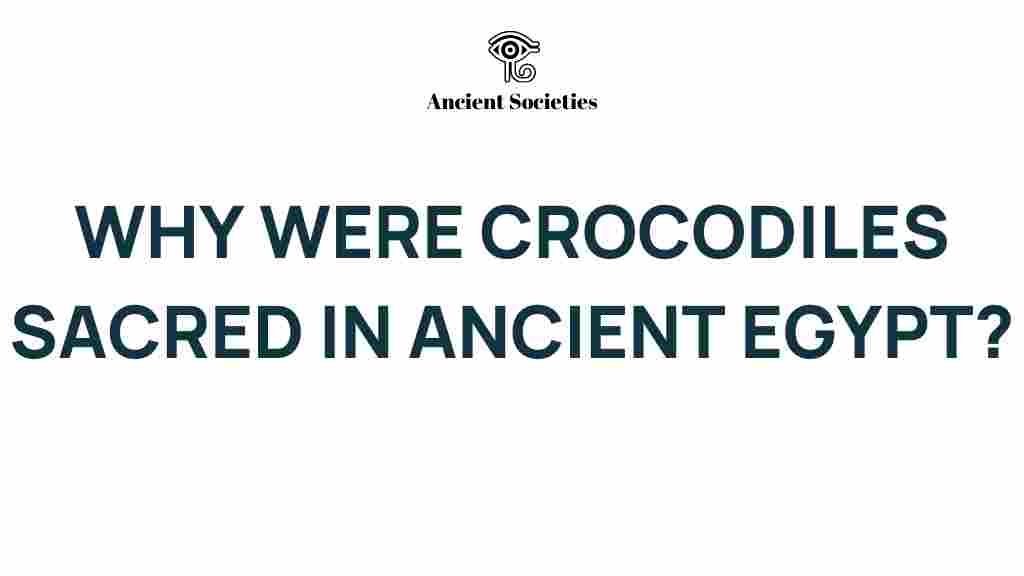Crocodiles: Sacred Animals in Ancient Egypt
In the vast tapestry of Ancient Egypt, few creatures captivated the imagination and reverence of its people like the crocodile. These magnificent reptiles were not merely part of the landscape; they were woven into the very fabric of Egyptian mythology, religion, and culture. In this article, we will explore the reasons behind the sacred status of crocodiles, their symbolism, and their role in the worship practices of the ancient Egyptians.
The Nile: A Crucible of Life and Death
The Nile River, often regarded as the lifeblood of Ancient Egypt, was home to a variety of wildlife, including crocodiles. These creatures thrived in the rich ecosystem of the Nile, which provided food, water, and a habitat for diverse species. The relationship between the Nile and its crocodiles was complex and multifaceted, influencing the way the Egyptians viewed these reptiles.
- Source of Life: The Nile was essential for agriculture, providing irrigation for crops. Crocodiles, being apex predators, played a role in maintaining the ecological balance.
- Symbol of Danger: While crocodiles were vital to the ecosystem, they also posed a threat to humans, serving as a reminder of the dangers present in nature.
Crocodiles in Egyptian Mythology
Crocodiles held a prominent place in Egyptian mythology. One of the most significant deities associated with crocodiles was Sobek, the god of the Nile, fertility, and protection. Sobek was often depicted as a man with a crocodile head, symbolizing the duality of life and death.
- Sobek’s Attributes: Sobek was revered for his power to control the waters of the Nile and was believed to protect the pharaohs and the nation.
- Worship Practices: Temples dedicated to Sobek, such as the one in Kom Ombo, attracted worshippers who sought his favor and protection.
The Symbolism of Crocodiles in Ancient Egyptian Culture
The symbolism of crocodiles in Ancient Egypt extended beyond mere mythology. They represented various themes that resonated deeply with the Egyptian people.
- Protection: Crocodiles were seen as protectors of the waters and, by extension, the people who relied on the Nile.
- Fertility: Their association with the fertility of the Nile underscored their importance in agricultural cycles.
- Transformation: The crocodile’s ability to adapt and thrive in both water and land mirrored the Egyptian belief in transformation and rebirth.
Worship and Rituals Involving Crocodiles
The sacred status of crocodiles led to unique worship practices in Ancient Egypt. These rituals not only honored Sobek but also recognized the crocodile as a vital part of their existence.
- Offerings: Worshippers would make offerings of food, flowers, and other gifts at temples dedicated to Sobek.
- Symbolic Sacrifices: In some cases, live crocodiles were kept in temple pools, showcasing their sacred status and the belief in their divine connection.
Step-by-Step Process of Understanding Crocodile Worship
To fully appreciate the reverence shown to crocodiles in Ancient Egypt, it is essential to explore the process of understanding their role in society:
- Research the Historical Context: Understanding the environmental and cultural factors that influenced the Egyptians’ perception of crocodiles.
- Study Mythological Texts: Exploring ancient texts and inscriptions that mention Sobek and other crocodile-related deities.
- Analyze Archaeological Findings: Examining artifacts, temple ruins, and crocodile mummies can provide insight into the worship practices.
- Visit Museums and Exhibitions: Museums often display ancient artifacts related to crocodiles and their worship, offering a visual understanding of their significance.
Common Misconceptions About Crocodile Worship
Despite the rich history of crocodiles in Ancient Egypt, several misconceptions persist. Here are some common ones:
- Crocodiles Were Only Feared: While they were feared, they were also revered and respected as sacred creatures.
- All Crocodiles Were Worshipped: Not all crocodiles were considered sacred; it was primarily those associated with Sobek that held divine significance.
Modern Interpretations and Cultural Impact
The legacy of crocodiles in Ancient Egypt continues to influence modern culture. From literature to film, their symbolism endures, reflecting themes of power, danger, and transformation. The fascination with these creatures is evident in various cultural expressions:
- Literature: Many authors draw upon Egyptian mythology, using crocodiles as symbols of hidden knowledge and primal instincts.
- Film and Media: Films often depict ancient Egypt with a focus on its mythology, portraying crocodiles as both protectors and threats.
Understanding the Cultural Significance of Sacred Animals
The reverence for crocodiles is part of a broader tradition of sacred animals in many cultures. In Ancient Egypt, the worship of animals reflected the society’s values, beliefs, and relationship with nature.
- Symbolism of Sacred Animals: Sacred animals often represent divine attributes, serving as intermediaries between humans and the gods.
- Role in Religion: The worship of these animals played a crucial role in religious practices, influencing rituals and societal norms.
Conclusion: The Enduring Legacy of Crocodiles in Ancient Egypt
The enigmatic reverence for crocodiles in Ancient Egypt is a testament to the complex relationship between humans and nature. These sacred animals symbolized power, protection, and fertility, embodying the duality of life and death. Through mythology, worship, and cultural practices, crocodiles left an indelible mark on Egyptian society, influencing its religion and culture for centuries.
As we explore the rich history of sacred animals like crocodiles, we gain insight into the values and beliefs that shaped one of the world’s most fascinating ancient civilizations. For more information on the intersection of culture and mythology, visit this cultural study resource.
To delve deeper into the complexities of Egyptian mythology, check out this comprehensive guide.
This article is in the category Culture and created by AncientSocieties Team
